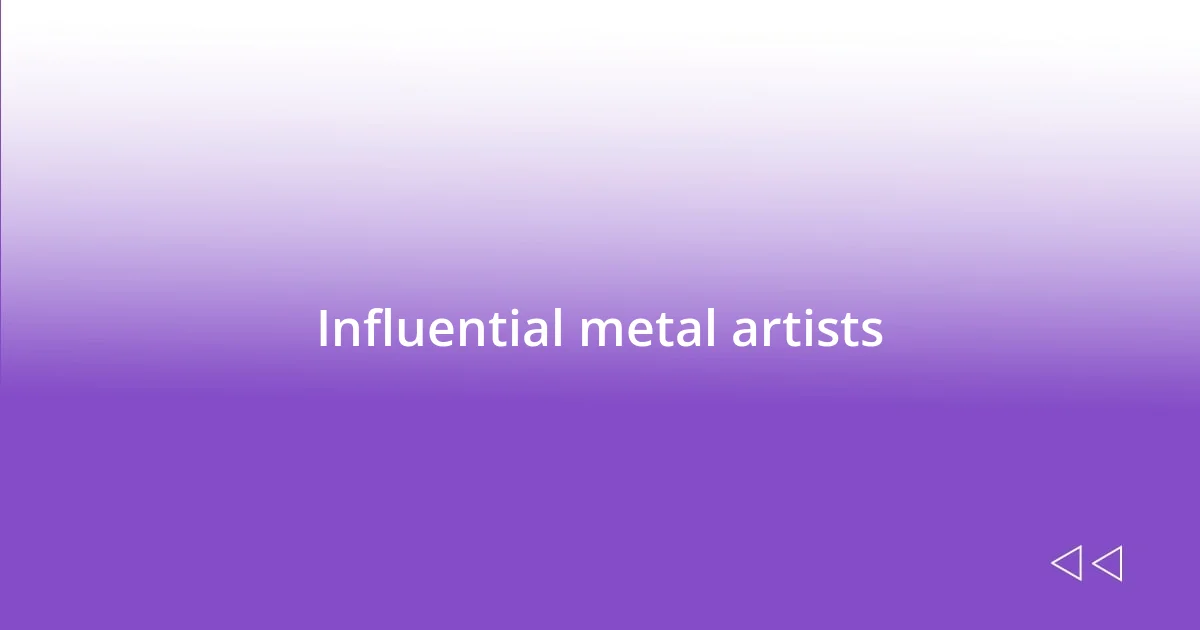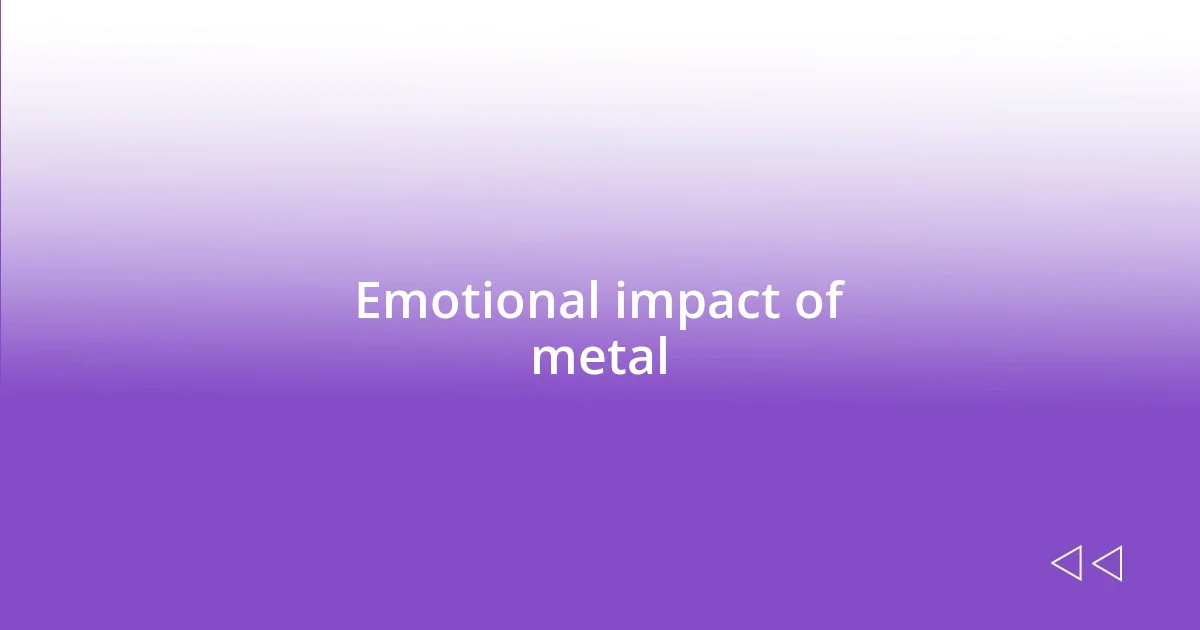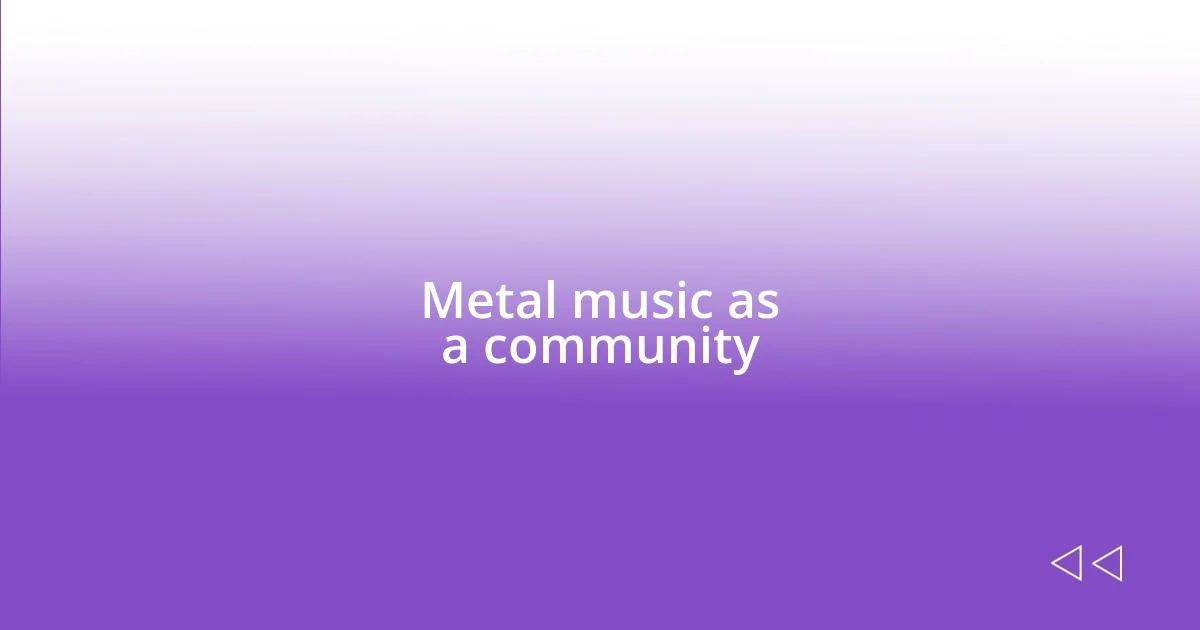Key takeaways:
- Metal music, originating in the late 1960s and 1970s, is characterized by heavy riffs and emotional depth, exploring themes like personal struggle, rebellion, and fantasy.
- The community around metal fosters deep personal connections and inclusivity, creating bonds among fans through shared experiences and challenges.
- Influential artists such as Black Sabbath, Metallica, and Opeth have shaped the genre, using their music to navigate complex emotions and social issues, providing solace and empowerment to listeners.

What is metal music
Metal music is a diverse and powerful genre that emerged in the late 1960s and early 1970s. It’s characterized by heavy guitar riffs, aggressive drumming, and often, intense vocals. I remember the first time I heard those roaring guitars; it was like a lightning bolt that electrified my spirit. Can you recall a moment when music changed your mood instantly?
What really sets metal apart is its emotional depth and lyrical themes, which often explore topics like personal struggle, fantasy, and even social issues. I’ve found that many metal songs resonate with feelings of anger or despair, almost like a cathartic release. Have you ever found yourself belting out lyrics in your car that just perfectly articulate what you’re feeling inside?
The genre encompasses various subgenres, from thrash to doom to black metal, each with its own unique flair. I personally gravitate towards progressive metal, where complex song structures and thought-provoking lyrics challenge the norm. Isn’t it fascinating how one genre can branch out into so many styles, each telling a different story?

Personal connection to metal
Metal music has a unique way of creating deep personal connections. It’s not just about the music; it’s about what it represents. I remember listening to a particular album during a tough time in my life. The tracks were like a mirror, reflecting my turbulent emotions. Have you ever felt that a song was written just for you?
The visceral energy of metal also empowers me in my daily life. Whenever I face challenges, I play some of my favorite tracks to fuel my motivation. In those moments, the aggressive riffs and pounding drums feel like an anthem of strength. Can you think of a song that lifts you up when you need it the most?
Moreover, the community around metal music fosters a sense of belonging. At concerts, I’ve felt an indescribable bond with fellow fans who share a love for the genre. It’s a reminder that we’re all in this together, experiencing the highs and lows that life throws our way. Isn’t it incredible to connect with others over something as powerful as music?
| Aspect | Personal Connection |
|---|---|
| Emotional Reflection | Music as a Mirror |
| Empowerment | Motivation through Sound |
| Community | Shared Experiences |

Influential metal artists
When I think of influential metal artists, a few names come to mind that have really shaped the genre. Take Black Sabbath, for example; their heavy riffs and dark themes laid the foundation for what metal could be. I remember the first time I heard “Iron Man,” and the chilling aura of it left a lasting impression. It was as if they were opening a door to another world, filled with powerful imagery and raw emotion.
Here are some artists who have made a significant impact on metal music:
– Black Sabbath: Pioneers of the genre, often considered the fathers of heavy metal.
– Metallica: Their complex compositions and social themes shifted metal into the mainstream.
– Iron Maiden: Known for their epic storytelling and symphonic style, they’ve influenced countless bands.
– Judas Priest: They brought a new level of aggression and complexity, defining the sound of heavy metal.
– Slayer: Their fast tempos and intense subject matter pushed boundaries in thrash metal.
– Pantera: Fusing groove and aggression, they redefined metal in the ’90s and inspired a generation.
– Sepultura: Their incorporation of tribal elements and social issues added depth to the genre.
– Opeth: Blending metal with progressive rock, they opened avenues for artistic expression within the genre.
The emotional impact of these artists is something I can personally attest to. For instance, Metallica’s “Fade to Black” has accompanied me through moments of introspection. It feels like a comforting embrace during darker days, reminding me that it’s okay to feel vulnerability. I often find myself reflecting on how their music not only resonates with struggles but also offers a pathway to healing.
- Motivators: Artists like Killswitch Engage deliver energizing tracks that help lift my spirits and push me forward when I’m feeling down.
- Storytellers: Opeth’s lyrics often plunge into philosophical depths, allowing me to ponder life’s mysteries while being completely captivated.
- Activists: Bands like Sepultura inspire awareness about social injustices, weaving urgency into their sound.
Every listen feels like stepping into a new chapter, guiding me through life’s complexities just as these artists have navigated their paths. Isn’t it remarkable how these musicians can become a part of our narratives in unexpected ways?

Themes in metal music
Themes in metal music often delve into the darker and more complex aspects of human experience. For instance, many songs tackle themes like death, existentialism, and personal struggles. I remember listening to an album focused on the fragility of life, and it struck such a chord that I found myself reflecting on my own experiences with loss. Isn’t it fascinating how such heavy topics can create a safe space for listeners to confront their feelings?
Another prevalent theme is rebellion against societal norms. Metal music has always had a sense of defiance, whether it’s critiquing authority figures or embracing individualism. I recall attending a concert where the band delivered a powerful speech about standing up against oppression. The sheer energy in the crowd was electrifying—a testament to the unifying power of shared resistance. Have you ever felt that rush of adrenaline when you’re in a room full of people who stand for the same beliefs?
Additionally, mythology and fantasy serve as rich sources of inspiration in metal music. Artists often weave stories that transport listeners to epic battles and mystical realms, inviting us to escape reality. I’ve found that when I listen to bands like Blind Guardian, I not only escape into epic tales but also feel inspired to explore creativity in my own life. Isn’t it incredible how a mere song can spark our imaginations and reflect our desires for adventure and exploration?

Emotional impact of metal
The emotional impact of metal music runs deep and often resonates with our most profound feelings. I remember listening to Slipknot’s “Snuff” during a time when I felt utterly lost. The haunting melodies and raw, vulnerable lyrics articulated my feelings better than I could. It was as if the song was an honest reflection of my heartache, providing a sense of solace in shared struggle. Have you ever experienced a moment when music spoke to your soul?
What strikes me most is how metal can serve as a release valve for pent-up emotions. For instance, anthems like “Walk” by Pantera have this energizing quality that drives me to confront my frustrations head-on. There’s something incredibly cathartic about blasting heavy riffs—it’s like purging negativity from my system. I often think about how metal can be both an escape and a confrontation, inviting us to face our demons rather than hide from them. Have you found that the act of listening to metal helps you process your feelings?
In many ways, metal fosters a sense of community among its listeners, creating bonds over shared experiences. I’ll never forget the exhilaration of singing along to Disturbed’s “Down with the Sickness” at a live show. The electricity in the air was palpable, uniting everyone in a shared embrace of vulnerability and strength. It made me realize that, while metal often explores dark themes, it simultaneously cultivates a supportive space for healing and empowerment. Isn’t it amazing how music—especially metal—has this unique ability to lift us and connect us despite the struggles we face?

Metal music as a community
The community within metal music is something that has profoundly impacted my life. I recall the first time I stepped into a metal venue, surrounded by like-minded souls who shared my passion. The camaraderie felt electric, almost magnetic. We were all there for the same reason—to lose ourselves in the music and unite in our shared love for the genre. Isn’t it extraordinary how a shared experience can transform strangers into friends in an instant?
Beyond just enjoying the music, metal fans often find themselves forming lifelong bonds. There’s a unique understanding that comes from navigating the heavy themes that metal explores. I remember connecting with a fellow fan over our favorite band, which turned into hours of conversation about the personal experiences that shaped our love for the genre. That level of connection is something I cherish, as it creates a support system that extends far beyond the music itself. Have you ever felt that connection with someone simply because of the music you both love?
What makes this community even more special is its inclusivity, where everyone is welcomed regardless of background. At a recent festival, I was struck by the diversity in the crowd—people of all ages, races, and walks of life singing together. That moment solidified my belief that metal transcends barriers and fosters acceptance. It’s these shared experiences, framed by a culture of respect and understanding, that make metal music not just a genre but a global family. How often do you see such unity in the world around us?














